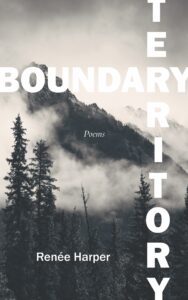Clarifying ‘what it is that matters’
Boundary Territory
by Renée Harper
Surrey: Now or Never Publishing, 2024
$19.95 / 9781989689776
Reviewed by Cathy Ford
*

Reading the work of the poet of Boundary Territory is new for me. Renée Harper, writer, artist, and professor of Literature and Creative Writing at Selkirk College in Nelson, presents in this collection of poetry a clarity of intent and style fully mature and confident in its own power. Harper’s work arrives as a potent collection of innocence and experience poems, sharp memory and reconciled consciousness compositions, that draw the reader in with an immediacy both refreshing and compelling.
Many contemporaries of Harper will recognize the individual but also the commonality of experience the poet relates. This is a narrative-driven poetry, coupled with the lyric edge of attention to history, cherished Indigenous sensibility and small town culture. Included in remarking the unsettled geography of environment, the various qualifiers and descriptors of homelessness, the search for direction in life, challenges to ambition, and questions of academic accomplishment, there is an ongoing commitment to personal accountability coupled with searing detail.
There is a conversation in this collection between a sense of isolation, and a longing for family, connection, community; an ongoing argument, perhaps, between the quest toward making personal, informed choices, and moving forward in one’s own life, on a trajectory that is daunting in its accelerated pace, and explicit in its closeness to danger. This poet apprehends the specific sparks of intellect, ideas and memories that explore the accumulative story, that personally and uniquely explain a life. These poems are not, however, written from a self-centred or self-absorbed impulse, to the point that they exclude a reader’s participation. The poems in Boundary Territory encourage re-imagining, re-making, re-meditating on alternative paths, ways other than the prescriptive, to reach an adulthood of one’s choosing, despite the odds.
Having studied and worked in the expressive arts of both painting and creative writing, this poet’s work reverberates with wonderful visual powers of description and a connection to the natural world. Many of these poems present a new take on the territory of the impressionistically visualized and explored “home” of beauty in landscape and many marvellously perceptive experiences within it. There is also the examination, in these poems, of the kind of call to action delineated in the concept of “despair work,” that those of us who undertake to work in positive and ongoing ways for world peace know, despite our distance from direct conflict, and the odds against making a difference, from a privileged safe place.

Some days, it is difficult to keep in mind that “think globally, act locally” is not an insignificant phrase. In the poems of Boundary Territory, the harms and near-escapes are forceful, immediate, enjambed ‘griefworks’ that compel the writer to take a stand, without pause or distance, with no perceived space between what the natural environment has sustained, whether through unaccountable neglect, trauma, fire, flood or sheer carelessness with this most vital life force. This collection stands as the poet’s vision and voice against causation, damage done, and sorrow. All that is observed, done to, as to nature, also marks the experience of the poet, creating a relationship within witness work and comprehensive understanding of the energies that direct unapologetic creativity and political action.
Encompassed by a precision of language and morning light clarity, stylistically Harper has created poems that are sharp-edged, infused with fresh air, never overwrought or overwritten. The immediate focus often leads to a kind of telescoping comprehension, from the near object to the longer, more distant view. Looking to re-find a sense of innocence, even optimism, by reaching into connection with the natural world, this poet makes it clear what it is that matters, what engages, visceral and sensory perceptions strengthened by a grasp of mortality.
Ghosting all these poems is the subtext of self-immolation, the wrack and warp of truth stories searched out. The weaving together of the power of these poems lies in bright apples, black birds exploding from ditches, grave hills, ghost images, spirit incursions, places where “our people left here/and landed there”; where “the lake swallows them with the taste of salt”; where palimpsests and life repetitions chant, relative to place, identity, mortality.
Moving from the flirt edge of endangered innocence, while deadly serious about entering into each offered experience on this poet’s life path, the voice here has a hard-earned maturity of vision that allows the reader in. The reader is encouraged to consider not only something of this poet’s lived experience, and what survival instincts have guided and sustained her, but to celebrate the smallest attention to detail, the awakening to one’s chosen path and lived environment, family remembrances, and yet being tied to the surrounds of British Columbia’s history of colonial “making and unmaking of place on unceded Indigenous territories” (from the Author’s Note).
These poems are an opening, a glimpse into honouring the boundaries of where Renée Harper lives and works, within the territories of the Sinixt, the Syilx, and the Ktunaxa First Peoples. It will be a joy to see where this poet, who has learned compassion for herself, and for the experiences and stories that are so valued and challenged within this geography, confidently moves next in her written work.

*

Cathy Ford is a poet, fictioniste, and memoirist working predominantly on the long poem, feminist issues, life and death concerns, social justice and peace, and our relationship with this beloved earth. She has published more than fifteen books, including the art of breathing underwater and Flowers We Will Never Know The Names Of—an abc book of the language of flowers and their transliteration, an interpretation of grief and protest, based on the Montreal Massacre. Her earlier books are published by blewointment press, Caitlin Press, Harbour Publishing, and Véhicule Press. She lives in Sidney. [Editor’s note: Cathy Ford has reviewed books by Sharon Thesen, Mona Fertig, Judith Copithorne, bill bissett, Jónína Kirton, and Linda Rogers for BCR.]
*
The British Columbia Review
Interim Editors, 2023-25: Trevor Marc Hughes (non-fiction), Brett Josef Grubisic (fiction and poetry) Publisher: Richard Mackie
Formerly The Ormsby Review, The British Columbia Review is an online book review and journal service for BC writers and readers. The Advisory Board consists of Jean Barman, Wade Davis, Robin Fisher, Barry Gough, Hugh Johnston, Kathy Mezei, Patricia Roy, and Graeme Wynn. Provincial Government Patron (since September 2018): Creative BC. Honorary Patron: Yosef Wosk. Scholarly Patron: SFU Graduate Liberal Studies.
“Only connect.” – E.M. Forster